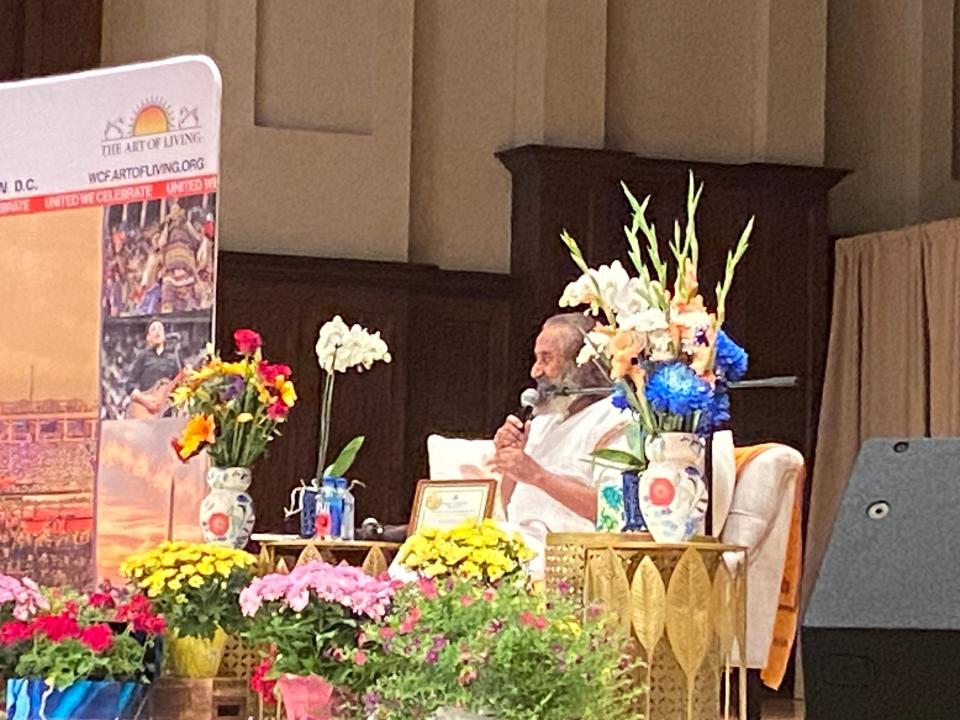World Culture Festival showed how food, music and dance helps us overcome our differences
Imagine an Olympic-sized event celebrating cultural diversity, inclusiveness, and oneness in today's turbulent world.
I witnessed this recently at the National Mall in Washington D.C. A sea of people of all colors, diverse cultures, and varying costumes gathered from the U.S. Capitol to the Washington Monument.
It was an awe-inspiring sight with 1.1 million people attending over three days with 17,000 performers from 180 countries at the World Culture Festival.
Often I wonder if we celebrate greatness in sports at national competitions, and celebrate political victories at inaugurations and rallies, why do we not celebrate culture and diversity at a grand level?
With this in mind, a non-profit organization, Art of Living Foundation, founded by Sri Sri Ravi Shankar has led three World Culture Festivals in Berlin, New Delhi, Bangalore, and now in Washington DC with a cumulative attendance of 8 million people.
Hear more Tennessee Voices: Get the weekly opinion newsletter for insightful and thought provoking columns.
Our cultural differences show we are more alike than we think
Diversity, inclusion, and unity may be abstract concepts, but they come alive when we share our cultures through food, music, and dance. For instance, we enjoy the diversity of Chinese cuisine, salsa dance, and Korean music knowing full well that we have contrasting views due to our political thought, educational background, and past experiences.

When we take time to celebrate each other's cultural diversity then our differences don’t seem that far apart. In fact, we are more collegial in our contentious conversations.
A celebration of cultures brings out our humanity. The compassion, caring, and cooperation that we don’t manifest during our divisiveness are shared during a cultural celebration.
Over a three-day event drummers from West Africa, dancers from Bolivia, and Alpine horn blowers from Switzerland took a common stage and the crowd joined them in dance and music.
Finding civility: How respect for each other's truth will improve America's political discourse
The World Culture Festival in Washington had its exhilarating moments with music hip hop legends dancing to the beat and sad moments with the wife of the late President Abe of Japan talking about the pain of her husband's assassination.
Also, there were thoughtful moments where U.S. Surgeon General Vikek Murthy spoke of an epidemic of loneliness and moments of silence where Sri Sri Ravi Shankar conducted deep meditation for a crowd of over 400,000.
Sign up for Black Tennessee Voices newsletter:Read compelling columns by Black writers from across Tennessee.
Nations have borders, but culture transcends country lines
Over the September weekend, there was irony as well. On the National Mall, there was a full moon, the scaffold-free Washington Monument was standing bold and majestic, and in the backdrop was the U.S. Capitol where lawmakers were furiously working to avert a government shutdown.
Even though I was initially skeptical, I have come to realize that a celebration of world cultures is a unique idea. Nations have borders, but culture does not.
The movement of culture does not require a passport or visa. Often our ties to culture are deeper than to our nation. Culture is the core of who we are and festivals are a celebration of culture.
Though I fret about how things are going bad in the world from wars to climate crisis, this fall weekend in Washington was a welcome change for the celebration. The World Culture Festival’s time has come. It serves as a blueprint for our future of how to live collaboratively as one world family with our diversities and divisiveness.
Manoj Jain, M.D., M.P.H., serves on the faculty of the Rollins School of Public Health, Emory University. He is an infectious disease physician who served as chief medical adviser to the mayor of Memphis on COVID-19. He is a consultant to the World Health Organization on Tuberculosis.
This article originally appeared on Nashville Tennessean: World Culture Festival reminds us how to overcome our differences

